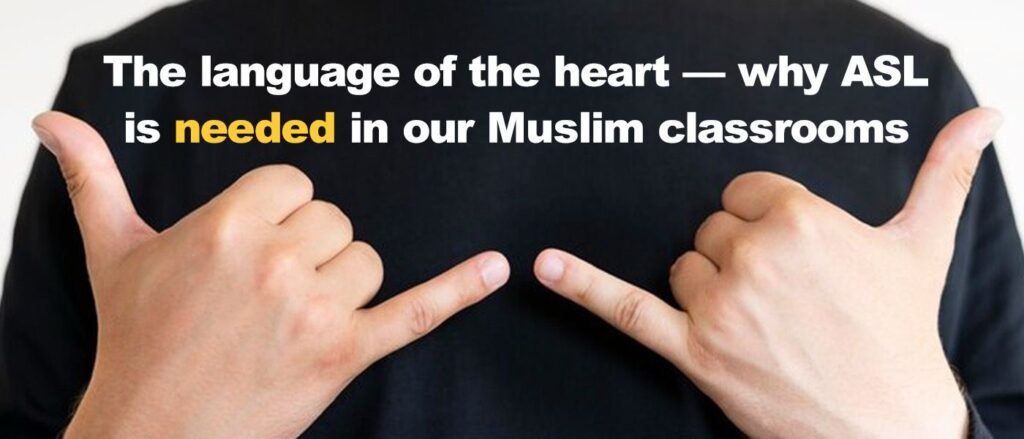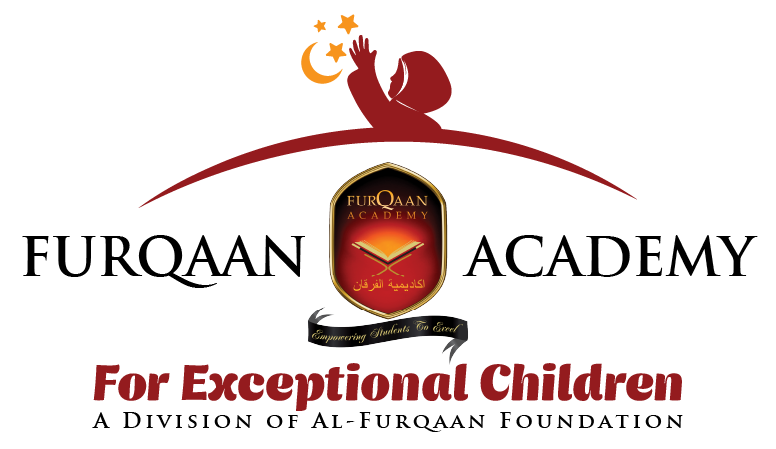
Every year on April 15, we celebrate American Sign Language (ASL) Day, and this is marked as a time to recognize and appreciate the rich history and cultural significance of ASL in the lives of the Deaf and Hard of Hearing community. This date marks the founding of the first school for the Deaf in the United States in 1817, and this momentous event reminds us all of how language, in all its forms, is a gift from Allah (SWT) to connect, express, and empower.
For us at Furqaan Academy for Exceptional Children, this day holds special meaning. It reminds us of the importance of communication for every child, especially those who navigate the world differently due to developmental, cognitive, or mental health challenges.
Many of our children are nonverbal, on the autism spectrum, have Down Syndrome, or other cognitive delays, struggle with traditional verbal communication. ASL offers them a powerful alternative to speak their piece.
American Sign Language, a skill that many are mastering in schools and workplaces, is a full-fledged language with its own grammar, structure, and cultural richness. When introduced early and with love, ASL can:
- Reduce frustration by giving children a way to express needs and emotions.
- Strengthen the parent-child bond.
- Encourage social interaction and learning.
- Boost confidence and independence.
- Serve as a bridge to Quran memorization and Islamic concepts through visual cues.
Islamically, being patient and honoring the needs of those who have a disability is a principle heavily encouraged by our own Prophet Muhammad (SAW). He (SAW) showed immense care for all people, including those with disabilities. He (SAW) encouraged compassion, communication, and accessibility. After all, our Prophet (SAW) was sent as a mercy to the world!
In a Sahih Muslim Hadith, there is a chapter that discusses the Prophet (SAW)’s closeness to the people, their seeking blessings from him, and the humility he (SAW) displayed towards them. Anas reports that a woman had a mental illness and, approaching the Prophet (SAW), she said, “I want something from you.” He (SAW) then responded, “Mother of [so and so], see on which side of the road you would like (to stand and talk) so that I may do the needful for you.” He (SAW) stood beside her on the roadside until she got what she needed.” (Sahih Muslim, 2326)
However, there is no doubt that grappling with any mental illness can be an exhausting journey on the body of the person, not to mention their loved ones/caregivers. Having an Islamic school where children can learn skills like ASL and implement them into their lives early on can lead to significant improvement on navigating such illnesses in the future. At Furqaan Academy for Exceptional Children, we integrate tools like ASL and AAC into our learning environment for students who may struggle with verbal communication. But the journey also begins and continues at home with you, the parent or caregiver.
Here are some tips we hope you will utilize to start incorporating ASL into your daily life:
- Learn simple Islamic signs like “Allah”, “salah”, “dua”, and “Alhamdulillah”.
- Use signs for daily routines like eating, brushing, or emotions.
- Attend ASL workshops designed for Muslim families.
- Practice patience and dua because small steps lead to big progress, bi idhnillah.
On this day, be sure to make a special dua to Allah (SWT) to bless our children!
O Allah, make our children a source of joy for us, their parents, open for them the doors of Your mercy, make all goodness easy for them, and make them a means for their family to enter Jannah.”
As Muslim caregivers, it is our responsibility and privilege to nurture our exceptional children with rahma, sabr, and ilm. Celebrating ASL Day is about honoring our children’s voices in whatever form they come, and upholding the dignity that Allah (SWT) has granted each of them.
At Furqaan Academy for Exceptional Children, we believe with certainty and love that EVERY child is a unique sign from Allah (SWT), created with purpose, potential, and divine precision. Whether a child communicates with words, signs, or simply with their presence, they are not broken. They are beautifully different.
Their value is not measured by grades, milestones, or diagnosis, but by their struggle, their sincerity, and the love they carry in their hearts. As the Prophet (SAW) taught us through his mercy and his actions, the most honored in Allah (SWT)’s sight are not the most eloquent, but the most God-conscious.
Our children are not just “included”; we believe they are essential to the Ummah. They teach us patience, unlock new dimensions of compassion, and bring us closer to Allah (SWT) through their resilience.
Let us build a future where EVERY child feels seen, and valued not despite their challenges, but because of the strength they show through them.
To every caregiver reading this: your child is not behind, they are on their own journey, and Allah (SWT) is walking that path with them.
